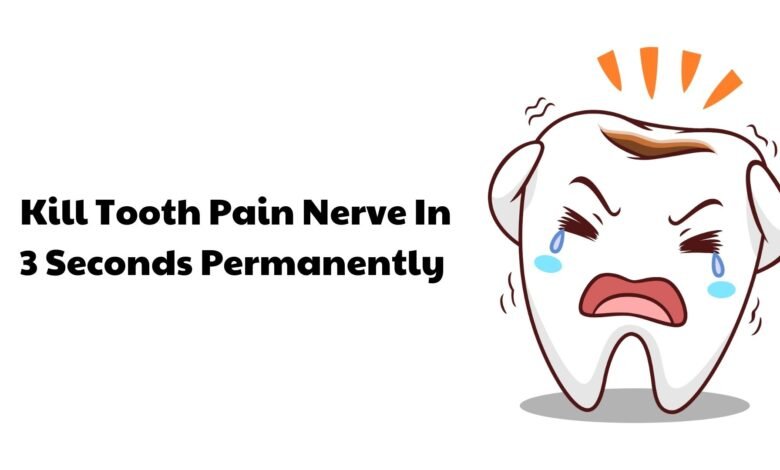Debunking the Myth: Killing Tooth Pain Nerve in 3 Seconds Permanently

The internet is rife with claims and remedies promising quick and permanent relief from tooth pain, with assertions like “kill tooth pain nerve in 3 seconds permanently” capturing the attention of desperate individuals seeking respite from dental discomfort. However, behind the allure of such assertions lies a complex web of misconceptions, half-truths, and potentially harmful advice. In this comprehensive analysis, we delve into the science behind tooth pain, explore the feasibility of “killing” the tooth pain nerve in mere seconds, and provide evidence-based strategies for managing dental discomfort effectively and responsibly.
Understanding Tooth Pain: The Root of the Issue
Tooth pain, clinically known as odontalgia, is a multifaceted phenomenon stemming from various underlying causes, including dental decay, gum disease, trauma, and nerve inflammation. At the heart of tooth pain lies the intricate network of nerves, blood vessels, and tissues housed within the tooth structure and surrounding oral cavity.
When the delicate balance of this network is disrupted by factors such as bacterial infection, dental trauma, or structural damage, it can give rise to sensations of throbbing, sharpness, or dull ache commonly associated with tooth pain. Central to this experience is the role of the dental pulp, a soft tissue containing nerves and blood vessels housed within the inner chamber of the tooth.
Debunking Misconceptions About “kill tooth pain nerve in 3 seconds permanently”
The notion of “killing” the tooth pain nerve in a matter of seconds, thereby providing instant and permanent relief, is an enticing proposition that has proliferated across online platforms and social media channels. However, the reality behind such claims is far more nuanced and scientifically dubious.
First and foremost, the concept of “killing” the tooth pain nerve in a matter of seconds oversimplifies the complex nature of dental pain and the underlying mechanisms at play. While certain interventions may offer temporary numbing or relief from tooth pain, achieving permanent resolution typically requires addressing the underlying cause of the pain, whether it be dental decay, infection, or structural damage.
Moreover, the notion of “kill tooth pain nerve in 3 seconds permanently” the tooth pain nerve raises ethical and safety concerns, as any intervention capable of permanently desensitizing or damaging nerve tissue could have profound implications for oral health and sensory function.
Evidence-Based Strategies for Managing Tooth Pain
While the promise of instant relief from tooth pain may be alluring, it is essential to approach dental discomfort with caution and discernment. Instead of relying on quick-fix solutions or unverified remedies, individuals experiencing tooth pain are encouraged to adopt evidence-based strategies for managing their symptoms and seeking professional dental care when necessary.
- Over-the-Counter Pain Relief: Non-prescription pain relievers such as ibuprofen or acetaminophen can provide effective temporary relief from tooth pain by reducing inflammation and blocking pain signals.
- Topical Analgesics: Over-the-counter topical analgesic gels or creams containing ingredients such as benzocaine or lidocaine can help alleviate localized tooth pain when applied directly to the affected area.
- Warm Saltwater Rinse: Gently rinsing the mouth with warm saltwater can help reduce inflammation, soothe oral tissues, and alleviate discomfort associated with tooth pain and gum sensitivity.
- Avoiding Trigger Foods and Beverages: Certain foods and beverages, such as hot or cold items, sugary snacks, and acidic drinks, can exacerbate tooth pain and sensitivity. Avoiding these triggers can help minimize discomfort and promote oral health.
- Maintaining Good Oral Hygiene: Practicing regular brushing, flossing, and rinsing with antimicrobial mouthwash can help prevent dental issues such as decay and gum disease, reducing the likelihood of experiencing tooth pain.
- Seeking Professional Dental Care: In cases of persistent or severe tooth pain, it is crucial to seek evaluation and treatment from a qualified dental professional. Dentists can diagnose the underlying cause of tooth pain and recommend appropriate interventions, such as dental fillings, root canal therapy, or extractions, to address the issue effectively.
Conclusion: Kill Tooth Pain Nerve in 3 Seconds Permanently
While the allure of instant relief from tooth pain may be tempting, it is essential to approach such claims with skepticism and critical thinking. The notion of “kill tooth pain nerve in 3 seconds permanently” the tooth pain nerve in a matter of seconds is not only scientifically dubious but also potentially harmful, as it overlooks the complex nature of dental pain and the importance of addressing underlying dental issues.
By adopting evidence-based strategies for managing tooth pain and seeking professional dental care when necessary, individuals can navigate dental discomfort with wisdom and caution, prioritizing their oral health and well-being. Remember, there are no quick fixes or shortcuts when it comes to dental health – only informed decisions and responsible care can pave the way to lasting relief and a healthy smile.




